
martes, 29 de enero de 2013
sábado, 26 de enero de 2013
Forex Multi year range breakout
Forex
The market had a breakout last week. The breakout was preceded by 13 days of base. The breakout also coincides with market taking out multi year high.
Below the surface quality breakouts on momentum stocks are increasing. The breadth trends are positive for last couple of weeks.


The market had a breakout last week. The breakout was preceded by 13 days of base. The breakout also coincides with market taking out multi year high.
Below the surface quality breakouts on momentum stocks are increasing. The breadth trends are positive for last couple of weeks.
jueves, 24 de enero de 2013
Forex Swing trading opportunities
Forex
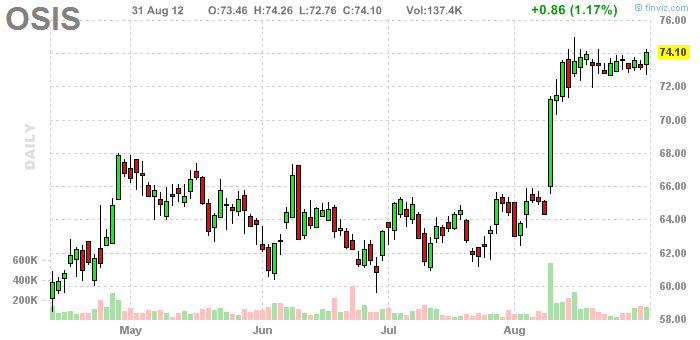
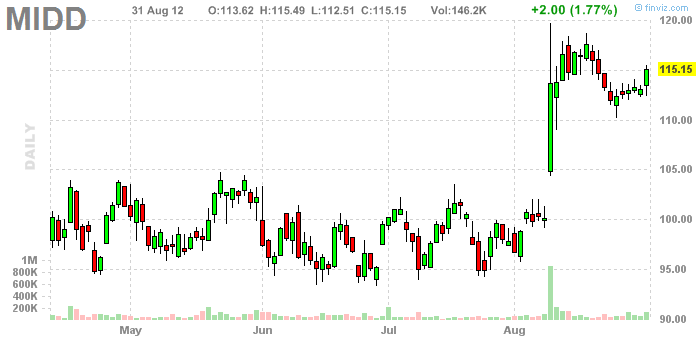
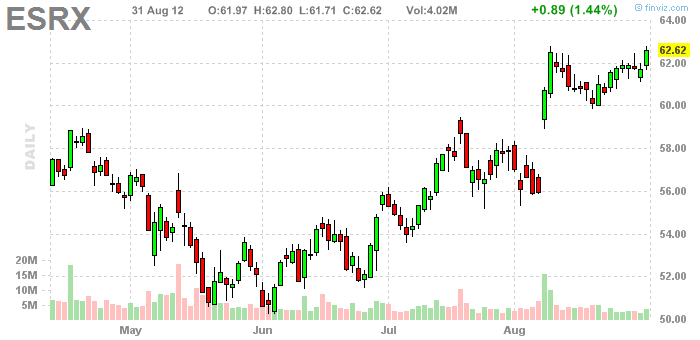
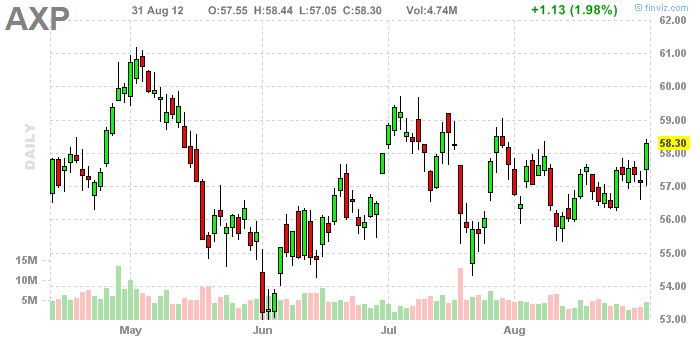
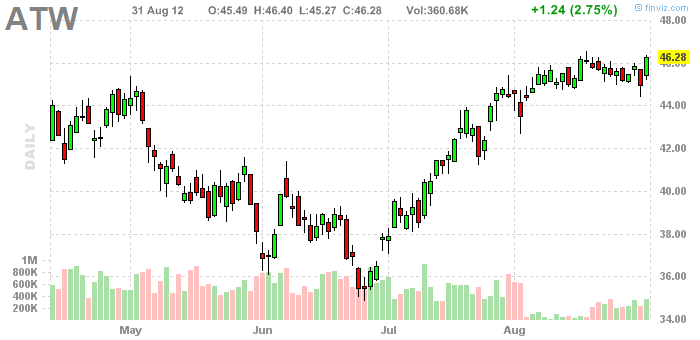
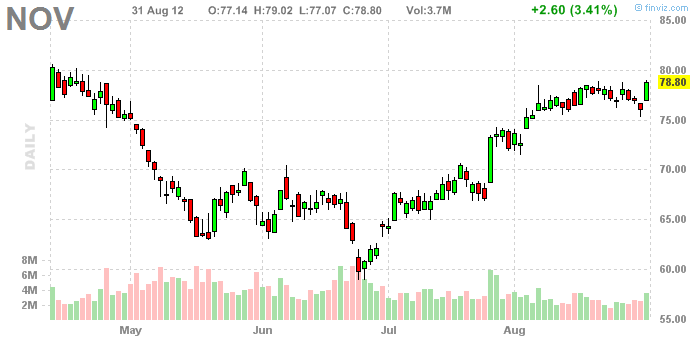


Several stocks are breaking out and there are some nice setups showing up in our scans. Many stocks are going sideways during market consolidation and are now breaking out.






martes, 8 de enero de 2013
Oil Obama Said to Reprise Deficit, Tax Proposals for 2013 Budget
Oil Obama Said to Reprise Deficit, Tax Proposals for 2013 Budget President Barack Obama will reprise previously rejected deficit-reduction plans and tax increases on the wealthy while proposing new incentives for companies to return jobs to the U.S., as part of his fiscal 2013 budget, administration officials said. The election-year spending plan, due to be presented to Congress Feb. 6, is intended to demonstrate the administration's intent to chip away at the nation's long-term deficits. The nation is at a turning point, Obama told business leaders yesterday at a White House event, where he promised to seek tax breaks for companies that make new investments in the U.S. or bring jobs back from overseas. He didn't give details. 'After shedding jobs for more than a decade, American manufacturers have now added jobs for two years in a row,' Obama said. 'But when a lot of folks are still looking for work, now is the time for us to step on the gas.' Economic growth and job creation are expected to be the main issues in the presidential campaign this year. Mitt Romney, a former Massachusetts governor and the front-runner for the Republican nomination, is making criticism of Obama's stewardship of the economy a prime focus of his stump speeches. The unemployment rate has declined for four straight months to 8.5 percent in December, and the Labor Department has reported six consecutive months of job gains of 100,000 or more. Still, the rate has been above 8 percent for almost two years, and little headway has been made in recovering the 8.75 million jobs lost as a result of the recession that ended in June 2009. Election Issue Only one U.S. president, Ronald Reagan, has been re-elected since World War II with a jobless rate above 6 percent. Reagan won a second term with the rate on Election Day 1984 at 7.2 percent, having dropped almost three percentage points in the previous 18 months. Obama also is seeking to make headway on the deficit, which hit $1.3 trillion in fiscal 2011, the third highest as a percentage of gross domestic product since 1945. The president will offer a plan for deficit reduction along the lines of the $4 trillion proposal that he outlined last September. Two administration officials confirmed the plan on condition of anonymity because they weren't authorized to discuss it before it's announced. The previous plan called for $1.5 trillion in tax increases over the next decade, including the expiration of Bush-era tax cuts for families earning $250,000 or more a year. It also would make changes in mandatory spending programs, cutting Medicare and Medicaid and farm subsidies, selling government assets and reducing federal worker benefits. Republican Reaction A spokesman for House Speaker John Boehner said Congress would reject the deficit plan, just as it did last September. 'The president isn't serious if all he's offering are the same job-killing tax hikes that even Democrats in the Senate have already rejected,' Brendan Buck, the spokesman for the Republican leader, said in an e-mailed statement. 'Our debt is threatening the economy as well important programs many seniors rely on. We cannot afford another punt by the president.' Obama's last budget said the deficit in the current fiscal year would be $1.1 trillion, or 7 percent of GDP. By 2015 it would decline to $607 billion, or 3.2 percent of GDP, according to the administration's forecast. Because a 12-member so-called supercommittee of lawmakers failed to agree on a deficit-reduction plan in November, the agreement between the White House and Congress requires more than $1 trillion in automatic, across-the-board cuts in discretionary spending beginning in January 2013. Obama has threatened to veto any attempts to get around the spending cuts and blamed Republicans for refusing to compromise. One Budget One official dismissed speculation Obama would offer two budgets next month: a conventional version and a second one reflecting automatic cuts, known as sequestration. The Budget Control Act of last August doesn't require the Obama administration to submit a budget that includes specific details from a sequester, should it occur. Stan Collender, a budget expert and managing partner at Qorvis Communications LLC in Washington, told reporters at a Jan. 9 seminar that Congress will spend weeks after the elections trying to avoid automatic budget cuts. 'This will be the year of avoiding the sequester,' he said. Many of the tax and spending proposals in Obama's $3.7 trillion budget last year were ignored or rejected by Congress. His fiscal 2013 spending plan probably will encounter even more resistance in an election year when the presidency, every seat in the U.S. House and one-third of those in the Senate will be decided. To contact the reporter on this story: Roger Runningen in Washington at rrunningen@bloomberg.net To contact the editor responsible for this story: Mark Silva at msilva34@bloomberg.net
lunes, 7 de enero de 2013
Oil Retail sales: Shoppers pulled back at the holidays
Oil Retail sales: Shoppers pulled back at the holidays CNNMoney.comBy Chris Isidore | CNNMoney.com Consumers pulled back on their spending in December despite the holiday shopping season, according to a government report released Thursday. The Commerce Department report showed that overall retail sales rose only 0.1% compared to November -- falling short of forecasts of economists surveyed by Briefing.com, who were expecting a 0.4% rise. Excluding auto sales, which were relatively strong in the month, sales fell 0.2%; compared to forecasts of a 0.3% rise. Part of the reduced spending came from lower prices. Lower gasoline prices trimmed spending at gas stations by 1.6% compared to November. And spending at grocery stores also declined 0.2% in the same period amid reports of some lower food prices. Paul Dales, senior U.S. economist for Capital Economics, said it was somewhat positive that lower prices allowed non-discretionary spending to decline 0.6%, at the same time that discretionary spending rose 0.4%. 'It appears they're saving money when they go to fill up their cars, and spending it on something more enjoyable,' he said. But there were also declines in some retail categories that typically get a lift from holiday shoppers. The biggest was a 3.9% drop at electronic and appliance stores. Department store sales also fell 0.2%, leading to a 0.8% drop in general merchandise stores. Non-store retailers, typically online retailers, suffered a 0.4% drop. Mark Vitner, senior economist with Wells Fargo Securities, said his firm's measure of 'core' sales -- which excludes autos, gas stations and building materials -- posted the first monthly decline in a year. These excluded sectors are heavily influenced by volatile prices or by the business cycle. 'The decline here gets our attention,' he said. 'We do not think the consumer is completely going into hiding, but we do think that the pace of consumer spending growth is poised to slow.' Economists said that with other economic readings showing that stagnant wages were not keeping up with prices overall, and rising credit card balances, there's a limit in how much consumers will be able to spend -- even as a declining savings rate suggested that consumers were more willing to dip into savings. 'Households have realized that the savings only go so far,' said Dales. Disappointing December spending left overall sales up 6.5%, compared to 6% a year earlier which excludes auto sales. Bucking the trend were clothing retailers, which enjoyed a 0.7% rise in spending; and a 1.6% rise at building material and garden equipment retailers, which Dales said may have been helped by unusually mild weather. View this article on CNNMoney
Forex URA had good breakout
Forex 
.11% move in the market tells you the story. Nasdaq and Russell were better performing indexes. Overall it is a consolidation near high after a choppy move higher.

The Uranium ETF had a good breakout. It has been down for many month after the Japanese disaster. This might be possible start of bottoming process. 

.11% move in the market tells you the story. Nasdaq and Russell were better performing indexes. Overall it is a consolidation near high after a choppy move higher.
The Uranium ETF had a good breakout. It has been down for many month after the Japanese disaster. This might be possible start of bottoming process.
sábado, 5 de enero de 2013
jueves, 3 de enero de 2013
Oil IMF leads global push for euro zone to boost firewall
Oil IMF leads global push for euro zone to boost firewall The head of the International Monetary Fund (IMF) Christine Lagarde attends a session at the World Economic Forum (WEF) in Davos, January 28, 2012. REUTERS/Christian Hartmann The head of the International Monetary Fund (IMF) Christine Lagarde attends a session at the World Economic Forum (WEF) in Davos, January 28, 2012. REUTERS/Christian Hartmann By Paul Carrel and Emma Thomasson DAVOS, Switzerland (Reuters) - International Monetary Fund chief Christine Lagarde led a global push on Saturday for the euro zone to boost its financial firewall, saying 'if it is big enough it will not get used.' Lagarde, supported by the British finance minister, George Osborne, said the IMF could boost its support for the euro zone but pressed its leaders to act first. Some attendees at the Davos Forum still doubted the viability of the currency union. Countries beyond the 17-country bloc want to see its members stump up more money before they commit additional resources to the IMF, which this month requested an additional 500 billion euros ($650 billion) in funding. 'Now is the time - there has been a lot of pressure building in order to see a solution come about,' Lagarde told a Forum panel discussion on the economic outlook from which euro zone leaders - most notably Germany - were conspicuously absent. 'It is critical that the euro zone members develop a clear, simple firewall that can operate both to limit the contagion and to provide this sort of act of trust in the euro zone, so that the financing needs of that zone can actually be met,' she said. Lagarde's comments rounded out a crescendo of calls at the Davos Forum for the euro zone to boost its financial defenses. The annual five-day conference began with German Chancellor Angela Merkel deflecting pressure to do so. In a carefully worded keynote address, Merkel suggested doubling or even tripling the size of the fund may convince markets for a time, but warned that if Germany made a promise that could not be kept, 'then Europe is really vulnerable.' On Friday, U.S. Treasury Secretary Timothy Geithner pressed Europe to make a 'bigger commitment' to boosting its firewall. Two bankers who attended meetings with Geithner at the Forum said on Friday the United States was looking for the euro zone to roughly double the size of its firewall to 1.5 trillion euros. There was no immediate comment from the U.S. Treasury. Osborne said the currency bloc must beef up its firewall before other countries increase their funding to the IMF. 'I think the euro zone leaders understand that,' said Osborne, the only European minister on Saturday's panel discussion on the global economic outlook in 2012. 'There are not going to be further contributions from G20 countries, Britain included, unless we see the color of their money,' he added, calling for the euro zone 'to provide a significant increase in available resources.' MORE OPTIMISM...FOR SOME Japanese Economics Minister Motohisa Furukawa echoed Osborne's comments, saying: 'Without the firm action of Europe, I don't think the developing countries like China or others are willing to pay more money for the IMF.' On condition that the euro zone boosts its own defenses, he said Japan and other countries were willing to additional support via the IMF. Lagarde said, however, that if the international lender's resources were boosted sufficiently, this would raise confidence to such a degree that they would not be needed. 'If it is big enough, it will not get used. And the same applies to the euro firewall for that matter,' she added. Japanese Prime Minister Yoshihiko Noda, speaking to the Forum by video link from Tokyo, said Japan was working with South Korea and India to reduce the risk of the euro zone crisis spreading to Asia. 'Japan stands ready to support the euro zone as much as possible,' he added. Mexico's central bank chief, Agustin Carstens, said on Friday he believed a consensus was building on boosting the IMF's resources to help European countries and others that might need aid from the global lender. There has been a palpable sense of hope at the Davos Forum that the euro zone is pulling back from the brink of catastrophe, though business leaders are equally worried that Europe's woes will hold back a global recovery. Osborne saw some signs of optimism. 'People have commented on the mood of this conference being quite somber but having been here for a couple of days people have also pointed out that actually people are slightly more optimistic at the end of the week than the beginning,' he said. However, Davos 2011 also ended on upbeat note about the euro zone and a feeling that worst of the crisis was over - only for the situation to deteriorate and financial markets to turn their fire on Italy, the bloc's third biggest economy. 'The euro zone is a slow-motion train wreck,' said economist Nouriel Roubini, made famous by predictions of the 2008-09 global banking crisis. He expected Greece, and possibly Portugal, to exit the bloc within the next 12 months and believed there is a 50 percent chance of the bloc breaking up completely in the next 3-5 years. Hong Kong's Chief Executive, Donald Tsang, said no matter how strong the euro zone's firewall is, the market will look at the nature of the economies it is protecting. 'If it is protecting insolvent economies...no matter how strong the firewall is, it won't survive,' he said. (Additional reporting by Ben Hirschler; Editing by Jon Boyle)
martes, 1 de enero de 2013
Signals Comments from G20 finance chiefs meeting in Mexico
Signals Comments from G20 finance chiefs meeting in Mexico MEXICO CITY (Reuters) - Following are comments from policymakers attending the meeting of Group of 20 finance ministers and central bankers in Mexico City on Saturday. U.S. TREASURY SECRETARY TIMOTHY GEITHNER 'I think it's important to give Europe's leaders credit for what they have accomplished ... and put in place in terms of the architecture of a credible response in the last four months.' 'They have had a big impact in reducing the downside risks to growth ... though it's important not to rest on that progress.' 'I hope that we're going to see, and I expect we will see, continued efforts by the Europeans ... to put in place a stronger, more credible firewall.' CANADIAN FINANCE MINISTER JIM FLAHERTY 'I do want to encourage Germany to take that leadership role very seriously and come up with an overall euro zone plan.' 'I think that what I'd like to see in the communique is language that indicates that the real question is, when will we see the euro zone plan. And that discussions about other countries through the IMF supporting the euro zone plan should await the answer to the first question.' 'I don't think we're ever going to be able from the outside to impose a deadline on the euro zone. That's up to them.' GERMAN FINANCE MINISTER WOLFGANG SCHAEUBLE 'It does not make any economic sense to follow the calls for proposals which would be mutualizing the interest risk in the euro zone, nor in pumping money into rescue funds, nor in starting up the ECB printing press.' 'I am worried the overriding problems ... have not been tackled sufficiently. We have to be more daring when it comes to these large and fundamental challenges.' 'You know that Greece is a special and unique case...The main difficulty is a serious lack of competitiveness.' JAPANESE FINANCE MINISTER JUN AZUMI 'I'd like to see how Europe will make concrete efforts and then discuss how we can contribute.' 'I said that I expect debate on strengthening of the IMF lending capacity will progress on condition that the problem of Europe's debt crisis is put to an end by the G20 meeting in Washington in April.' 'The present firewall involves strengthening of EFSF and increase of upper cap on ESM. But I said (at G20) that they should be further strengthened.' 'The economy is somewhat picking up in the world as a whole, including Japan, and (we) want to put an end to the Europe crisis in the early spring and to accelerate the global economic growth.' BRAZILIAN FINANCE MINISTER GUIDO MANTEGA 'Emerging countries will only help under two conditions; first that they strengthen their firewall and second for the IMF (quota) reform be implemented.' 'I see most countries sharing a similar opinion that the Europeans have to strengthen their firewall.' JAY COLLINS, SENIOR CITIGROUP EXECUTIVE 'The lack of a firewall decision coming out of Europe takes a toll, speed matters.' 'Speed and urgency is critical.' BANK OF JAPAN GOVERNOR MASAAKI SHIRAKAWA 'Heightening geographical risks and some bright movements in advanced economies after the New Year are factors behind the underlying crude oil price hikes. Of course, monetary easing has been continuing but I don't see it as a major factor for driving up crude oil prices. Generally speaking, we'll closely watch effects and side-effects of monetary easing.' MARK CARNEY, BANK OF CANADA GOVERNOR AND CHAIRMAN OF THE FINANCIAL STABILITY BOARD 'We are cursed with living in extraordinary times. There are two critical challenges that are really facing policymakers at the moment. Restoring growth and stability in Europe. There's been quite appropriately tremendous attention paid to that. But at the same time, just doing that will not be enough.' 'We need to rebuild strong, sustainable, balanced growth in the global economy.' 'One of the issues in these G20 meetings has been that the issue of the moment has often, not surprisingly, crowded out this fundamental medium-term issue.' 'For emerging markets, the weak growth prospects and large accommodative monetary policies in the G3 (major advanced economies) tends to push capital flow towards them, exacerbating concerns about sudden stops and potentially causing a reaction in terms of capital controls.' 'Some emerging markets are reluctant to abandon exchange rate strategies which have served them so well in the past, and so there's a vicious circle here.' BANK OF ITALY GOVERNOR IGNAZIO VISCO 'During the G20 meeting we will discuss the outlook for the global economy and we will probably talk about the developments on the oil markets. Tensions are growing.' 'We have to be vigilant regarding oil.' 'At the moment we don't see the need for a new LTRO by the ECB, but we will have to see the whole effects of the second one (on February 29) before taking a decision.' 'Italy has made remarkable progress on the budget side, now it has to work on growth, even Europe should insist on growth.' OECD SECRETARY-GENERAL ANGEL GURRIA 'The Greek bailout was not a deal, it was an ordeal ... the problem was it came too late.' 'I don't know if Greece's debt target of 120 percent of GDP will be enough -- that will depend on whether Greece delivers on its policies.' 'We have run out of monetary policy room ... we have run out of fiscal room in most countries, some have a little fiscal room now.' 'The ECB's LTRO (long term refinancing operation) is no substitute for a European firewall.' 'It's already six months to a year late... We need a massive European firewall now.' (Compiled by Kieran Murray)
Suscribirse a:
Entradas (Atom)

